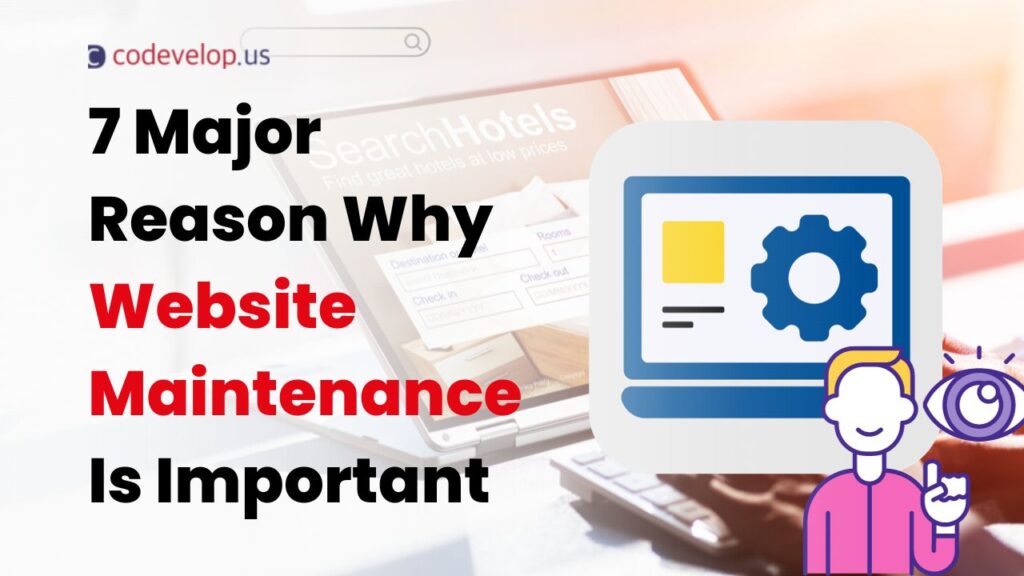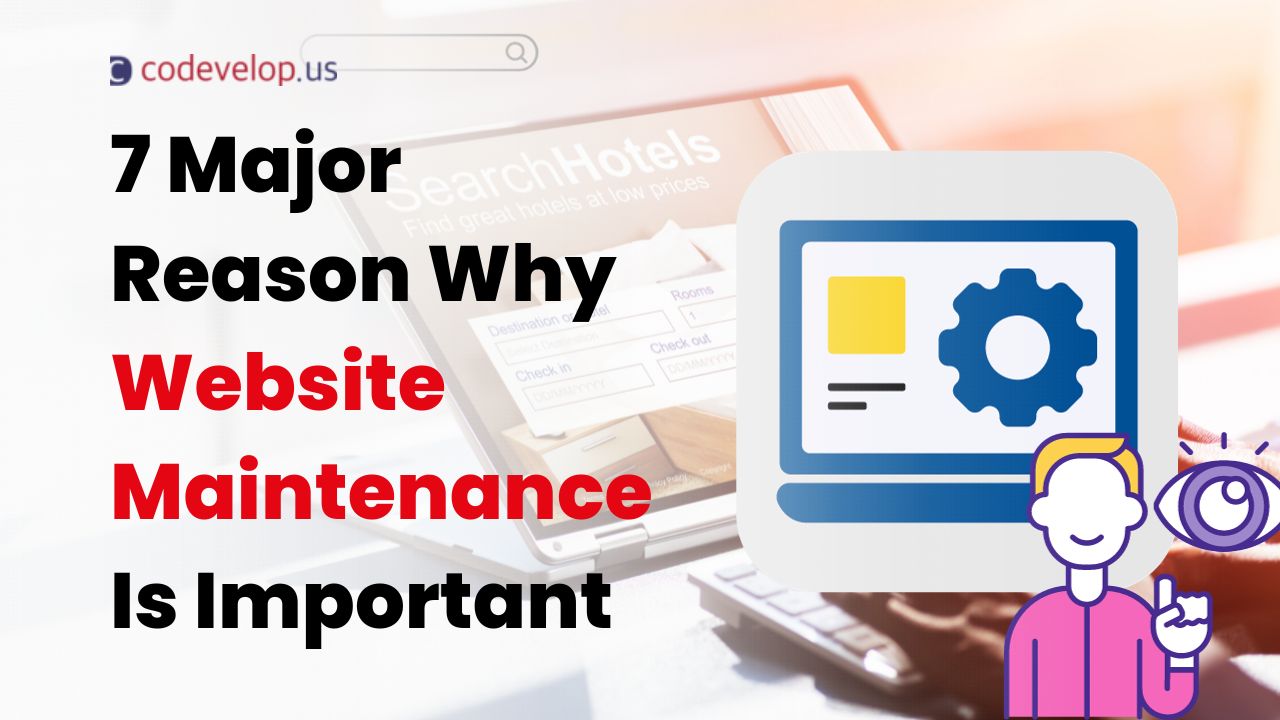- Here are seven Important reasons why websites require maintenance services:
- 1) Ensuring Up-to-Date Content
- 2) Enhancing Security Measures
- 3) Improving User Experience (UX)
- 4) Boosting SEO Performance
- 5) Fixing Technical Issues
- 6) Adapting to Industry Trends
- 7) Backup and Data Recovery
- Conclusion
- Frequently Ask Questions
Your website is often the first point of contact between your business and potential customers. It serves as a virtual storefront, a platform for engaging with your audience, and a crucial element of your brand online identity. However, Any other aspect of your business, your website requires regular maintenance to stay effective and secure. In this comprehensive guide, we'll delve into seven major reasons why website maintenance is of paramount importance for your business's success.

Here are seven Important reasons why websites require maintenance services:
1) Ensuring Up-to-Date Content
Website content is the lifeblood of your online presence. It educates, informs, and persuades visitors to take desired actions. However, in the fast-paced digital world, keeping your content current is essential. Outdated information can turn potential customers away and negatively impact your search engine rankings. Regular maintenance ensures your content remains fresh and relevant, effectively engaging your audience and building trust in your brand.
Content updates involve more than just changing dates, They encompass reviewing and revising articles, blog posts, product descriptions, and any other information on your site. By regularly refreshing your content, you demonstrate your commitment to providing valuable and accurate information to your audience.
Moreover, in certain industries, displaying outdated content can be detrimental. Imagine a healthcare website with information on outdated medical procedures or a tech blog with reviews of obsolete gadgets. Keeping content up-to-date isn't just good practice; it's often essential for credibility.
Regularly revisiting and enhancing your content also offers an opportunity to incorporate the latest SEO strategies, ensuring your pages rank well in search engine results. When you provide users with the most recent and relevant information, search engines are more likely to favor your site. you can get SEO Service in Portland by Codevelop.us
2) Enhancing Security Measures
Cyber threats are an ever-present danger in the digital realm. Without proper security measures, your website can become a prime target for malicious actors. Regular website maintenance includes updating security plugins, software, and protocols to protect against vulnerabilities. This proactive approach minimizes the risk of data breaches, hacking attempts, and malware infections, safeguarding both your website and your customers' sensitive information.
Security is an ongoing process. New vulnerabilities are discovered, and hackers develop new techniques. By staying vigilant and regularly updating your security measures, you ensure your website remains a fortress against threats. Moreover, with data protection regulations like GDPR and CCPA in place, maintaining the security of customer data is not just a best practice but often a legal requirement. Failing to do so can result in severe consequences.
3) Improving User Experience (UX)
User experience (UX) is a critical factor in the success of your website. A poorly functioning or slow-loading site can lead to user frustration and abandonment. Regular maintenance focuses on optimizing your website's performance, ensuring swift loading times, seamless navigation, and compatibility across various devices and browsers. A positive user experience not only keeps visitors engaged but also leads to higher conversion rates.
Performance optimization includes tasks like compressing images, cleaning up unnecessary code, and leveraging browser caching. These actions not only enhance the speed of your site but also reduce its load on servers, ensuring smooth functionality even during traffic spikes. Mobile responsiveness is another crucial aspect of UX. With an increasing number of users accessing websites via smartphones and tablets, ensuring that your site adapts to different screen sizes and resolutions is imperative. Regular testing and adjustments are essential to maintaining optimal mobile performance.
4) Boosting SEO Performance
Search Engine Optimization (SEO) is the driving force behind your website's visibility in search engine results. Search engines reward websites that offer fresh, relevant, and well-structured content. Through regular maintenance, you can fine-tune your SEO strategy, update keywords, and optimize meta tags. Additionally, addressing issues like broken links and improving site speed contributes to higher search engine rankings.
Search engines consider various factors when ranking websites. One crucial element is the regularity of updates. Search engine algorithms recognize that users prefer current information, so they prioritize sites that consistently provide fresh content.
By maintaining and updating your website, you signal to search engines that your site is active and relevant. This can lead to higher search rankings, increased organic traffic, and ultimately more conversions. it also involves the technical aspects of your site. Regular maintenance ensures that your website's structure is optimized for search engines, contributing to better rankings.
5) Fixing Technical Issues
Over time, websites can develop technical glitches, such as broken links, 404 errors, or malfunctioning forms. Regular Website Maintenance in Portland includes comprehensive checks for these issues and ensures prompt resolution. A website free of technical hiccups provides a seamless experience for users, ensuring that all aspects of your site function correctly. When users encounter broken links or error pages, it erodes their trust in your site, and they may quickly exit, potentially never returning.
Fixing technical issues is not only about improving the user experience but is also important for SEO. Search engine crawlers encounter similar issues as users when they encounter broken links or error pages. These issues can negatively impact your search rankings. Moreover, accessibility is a growing concern in web development. Ensuring your website is accessible to people with disabilities is not only ethically responsible but often legally mandated. Regular maintenance includes testing and addressing accessibility issues to ensure that all users can access your content.
6) Adapting to Industry Trends
The digital landscape is constantly evolving, with emerging trends and technologies. Regular website maintenance enables you to stay up-to-date with these changes. Whether it's integrating new design elements, social media feeds, or the latest e-commerce features, staying current ensures your website remains competitive and aligns with industry standards.
For example, consider the rise of voice search. With the increasing use of voice-activated devices like smart speakers and virtual assistants, optimizing your content for voice search is becoming crucial. Regularly updating your content and SEO strategy to accommodate these changes can give you a competitive edge. Trends in web design and user experience evolve. What was considered modern and attractive a few years ago might now appear outdated. Regular maintenance allows you to refresh your website's
7) Backup and Data Recovery
Data loss can have catastrophic consequences for any business. Regular website maintenance involves creating backups of your website and its data. In the event of technical issues, cyberattacks, or accidental deletions, you can swiftly recover your website's content and functionality. This minimizes downtime and mitigates potential disruptions to your business operations.
Data backup is like an insurance policy for your website. It ensures that even in the worst-case scenario, where data is compromised or lost, you have a copy to restore your site quickly. This is particularly critical if your website handles sensitive customer information, such as e-commerce sites with customer databases.
In addition to routine backups, regular maintenance includes verifying the integrity of these backups. It's not enough to have backups they must also be accessible and functional when needed. Regular testing and verification of backup systems are essential to ensure they serve their purpose effectively.
Conclusion
The importance of regular website maintenance cannot be overstated. It's the proactive approach to keeping your digital presence secure, engaging, and competitive. From content updates to security enhancements and adapting to industry trends, each aspect of maintenance contributes to the overall success of your website. Moreover, it's a safeguard against potential catastrophes, ensuring your data remains intact and your online business continues to thrive. Regular maintenance isn't an expense, it's an investment in the sustained growth and success of your online endeavors.
Frequently Ask Questions
Q1: How often should I perform website maintenance?
Website maintenance should ideally be performed monthly to address security, content updates, and technical issues. However, the frequency may vary based on your website's complexity and needs.
Q2: Can I handle website maintenance myself?
Basic tasks like content updates can be managed by website owners, but more technical aspects, such as security updates and data backups, are best left to professionals.
Q3: What happens if I neglect website maintenance?
Neglecting website maintenance can lead to various issues, including security vulnerabilities, a poor user experience, and decreased search engine rankings.
Q4: Is website maintenance expensive?
The cost of website maintenance varies depending on the scope of work. However, investing in maintenance is far more cost-effective than dealing with the consequences of an unsecured or malfunctioning website.
[sp_easyaccordion id="11313"]





Leave a Reply